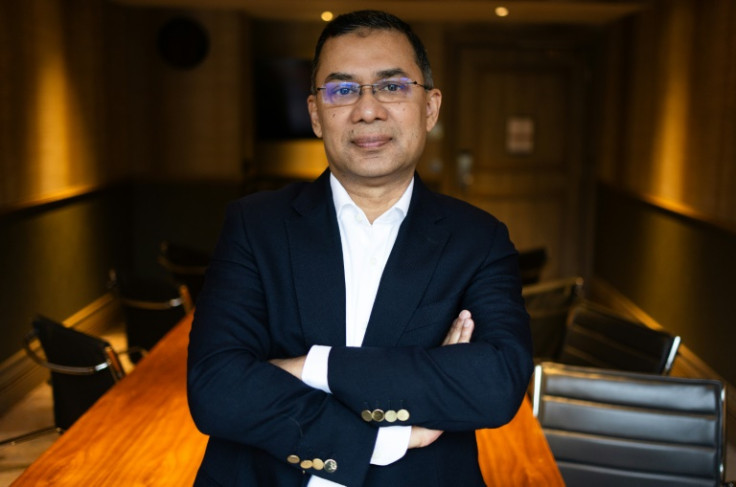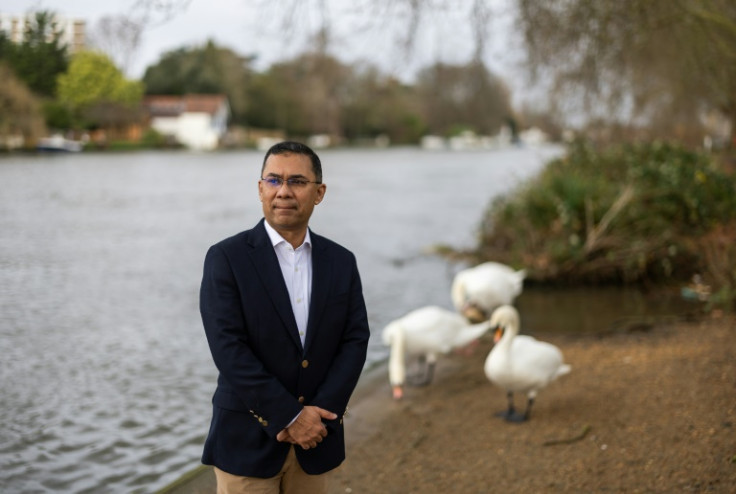Exiled Opposition Leader Condemns 'Sham' Bangladesh Election

Bangladesh's election on Sunday will be a "sham" designed to cement Prime Minister Sheikh Hasina's rule, exiled opposition leader Tarique Rahman has told AFP in an exclusive interview defending his party's boycott.
Rahman is heir to one of the country's two main political dynasties -- the other led by Hasina -- and has helmed its largest opposition party since the 2018 jailing of his mother, two-time premier Khaleda Zia.
Six years ago he was convicted in absentia of masterminding a deadly grenade attack on a campaign rally for Hasina -- a charge he insists is fabricated -- and sentenced to life imprisonment.
His party staged a months-long protest campaign last year demanding the prime minister's resignation that saw at least 11 people killed and thousands of its supporters arrested.
In his first interview with a major international media outlet for several years, Rahman, 56, said it would be inappropriate to have his party participate in a vote with a "predetermined" outcome.
"Bangladesh is approaching another sham election," he told AFP by email from London, where he has lived since 2008.
"Participating in an election under Hasina, against the aspirations of the Bangladeshi people, would undermine the sacrifices of those who fought, shed blood and gave their lives for democracy."
Rahman said the odds against his Bangladesh Nationalist Party (BNP) and dozens of other parties which joined the boycott had been overwhelmingly stacked against them by the ruling Awami League.
He accused it of fielding "dummy" opposition candidates aligned with the ruling party to give the election a patina of legitimacy.
This would create "an impression of competition even though all results are predetermined", he said.
He also claimed the party was attempting to drive up turnout by threatening to withhold government benefits from those who did not vote for Awami League candidates.
The United States, which sanctioned Bangladeshi security forces in 2021 over allegations of rights abuses, and other countries have also voiced their concerns about the conduct of this week's vote.
Hasina, in power since 2009, has repeatedly vowed that the election would be credible, after observers said previous polls won by her party in 2014 and 2018 were marred by irregularities.
"Go to the polling stations and cast votes in the morning to show the world that we know how to hold the election in a free and fair manner," she told a Saturday campaign rally.
Rahman and Hasina's families have between them ruled the world's eighth-most populous nation for all but 12 years since 1971.
Rahman's father, a former army chief, took the reins of the country after the assassination of Hasina's father, serving as president until his own assassination in 1981.
His mother Zia once teamed up with Hasina to restore democracy after a period of military rule, before the two became bitter adversaries as they competed for political power from the 1990s onward.
Rahman has kept a low profile in London since leaving his country shortly before Hasina took power.
He is rarely seen in public outside of weddings for prominent members of the Bangladeshi diaspora or events marking national holidays.
But with Zia jailed for corruption in 2018 and now confined to a Dhaka hospital in deteriorating health, Rahman has led the South Asian country's largest opposition party in her stead, speaking daily with cadres through video and phone conferences.
Last year the BNP mounted huge rallies, industrial strikes and road blockades that brought the capital to a standstill.
The campaign demanded Hasina resign and appoint a neutral caretaker government to oversee the election, an earlier convention in Bangladeshi politics that her government had abolished.
One rally in October ended in bloodshed and the BNP said around 25,000 opposition activists had been arrested in the ensuing crackdown. The government puts the figure at 11,000.
Hasina has accused Rahman of orchestrating violence that accompanied the protest campaign and raised the prospect of banning the BNP after the vote.
"We will not allow him to give orders from London to harm and kill people," she said on Saturday.
Rahman denied accusations that his party was responsible for a spate of arson attacks during the protests, which he described as a pretext for the government's crackdown.
But his own political career has long been under a cloud.
A leaked US embassy cable from 2008 calls him a "notorious and widely feared... symbol of kleptocratic government" who had "flagrantly" demanded bribes in return for procurement decisions and political appointments.
He was frequently accused of corruption during his mother's last premiership and was convicted of graft while in exile. He maintains his innocence.
Rahman was also convicted while abroad of organising a 2004 grenade attack on a political rally that injured Hasina and killed at least 20 others.
He insists the verdict was politically motivated and accused Hasina of rewarding the police officer who led the probe against him with a parliamentary nomination for this week's election.
"I am being targeted in a brutal and blatant manner," he said.
"Even after fifteen years of power, this regime has failed to produce (any) single genuine evidence."

© Copyright AFP 2025. All rights reserved.





















